Masters Project: Authentic Leadership, Work Life, and Patient Outcomes
VerifiedAdded on 2022/09/07
|50
|10014
|25
Project
AI Summary
This master's project investigates the influence of authentic leadership and areas of work life on patient outcomes within the nursing department at King Khalid Hospital, Majmaah, Saudi Arabia. The study, conducted by Mohammed Saed Almudhaybiri under the supervision of Dr. Brian Anonat Vasquez, explores the relationships between authentic leadership, areas of work life (including workload, job control, social support, reward, fairness, and values), and the quality of patient care. The research aims to determine how nursing managers' leadership styles and the work environment impact patient outcomes. The project includes a literature review, methodology with sample and instrument details, data analysis, ethical considerations, and limitations. It hypothesizes a positive correlation between authentic leadership, a supportive work environment, and improved patient outcomes, addressing the need for research in this area and its practical implications for nurse managers and healthcare organizations. The study seeks to explore the role of authentic leadership and areas of work life amongst nursing manager and investigate the effect on quality of patient’s care.
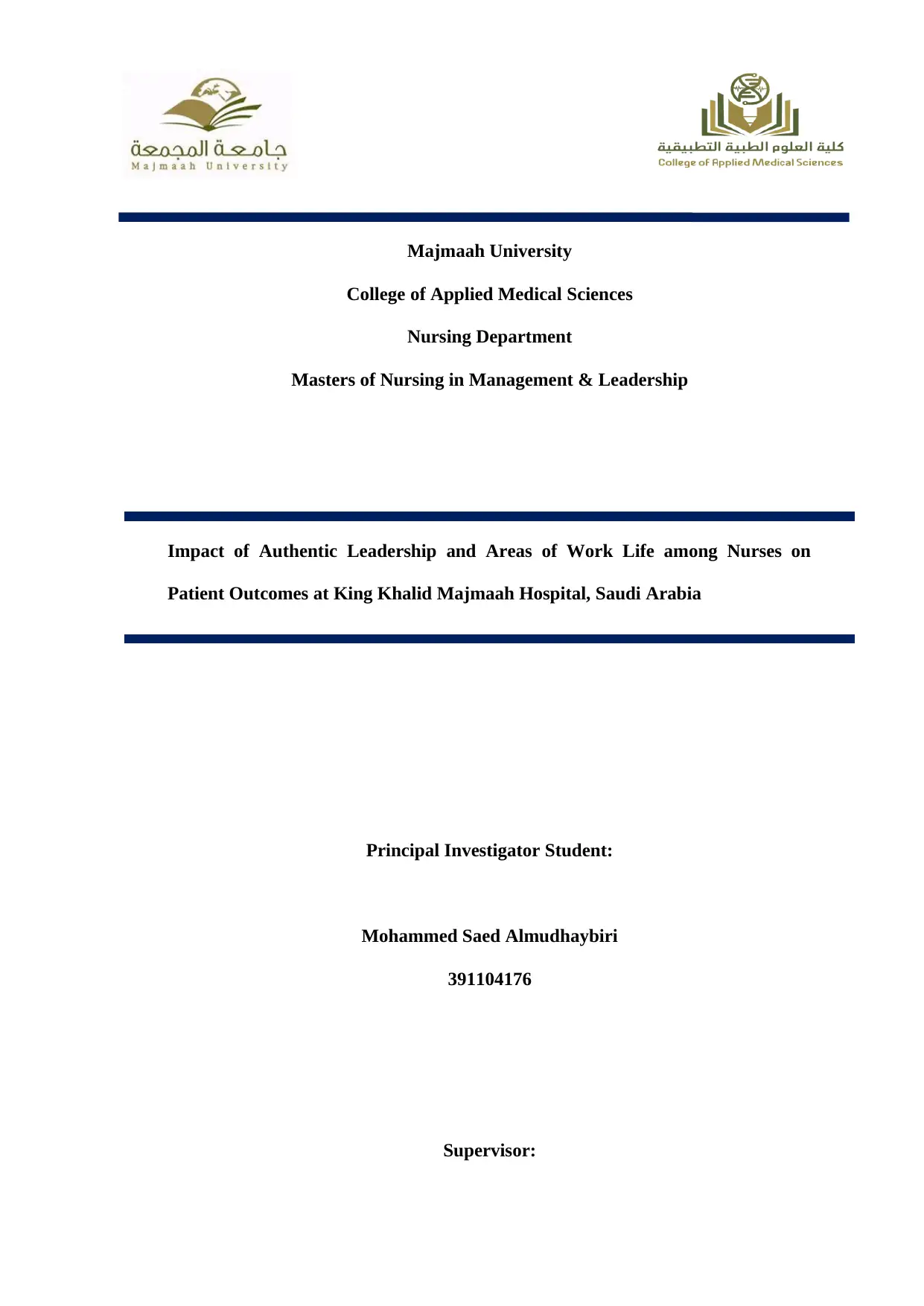
Majmaah University
College of Applied Medical Sciences
Nursing Department
Masters of Nursing in Management & Leadership
Impact of Authentic Leadership and Areas of Work Life among Nurses on
Patient Outcomes at King Khalid Majmaah Hospital, Saudi Arabia
Principal Investigator Student:
Mohammed Saed Almudhaybiri
391104176
Supervisor:
College of Applied Medical Sciences
Nursing Department
Masters of Nursing in Management & Leadership
Impact of Authentic Leadership and Areas of Work Life among Nurses on
Patient Outcomes at King Khalid Majmaah Hospital, Saudi Arabia
Principal Investigator Student:
Mohammed Saed Almudhaybiri
391104176
Supervisor:
Paraphrase This Document
Need a fresh take? Get an instant paraphrase of this document with our AI Paraphraser
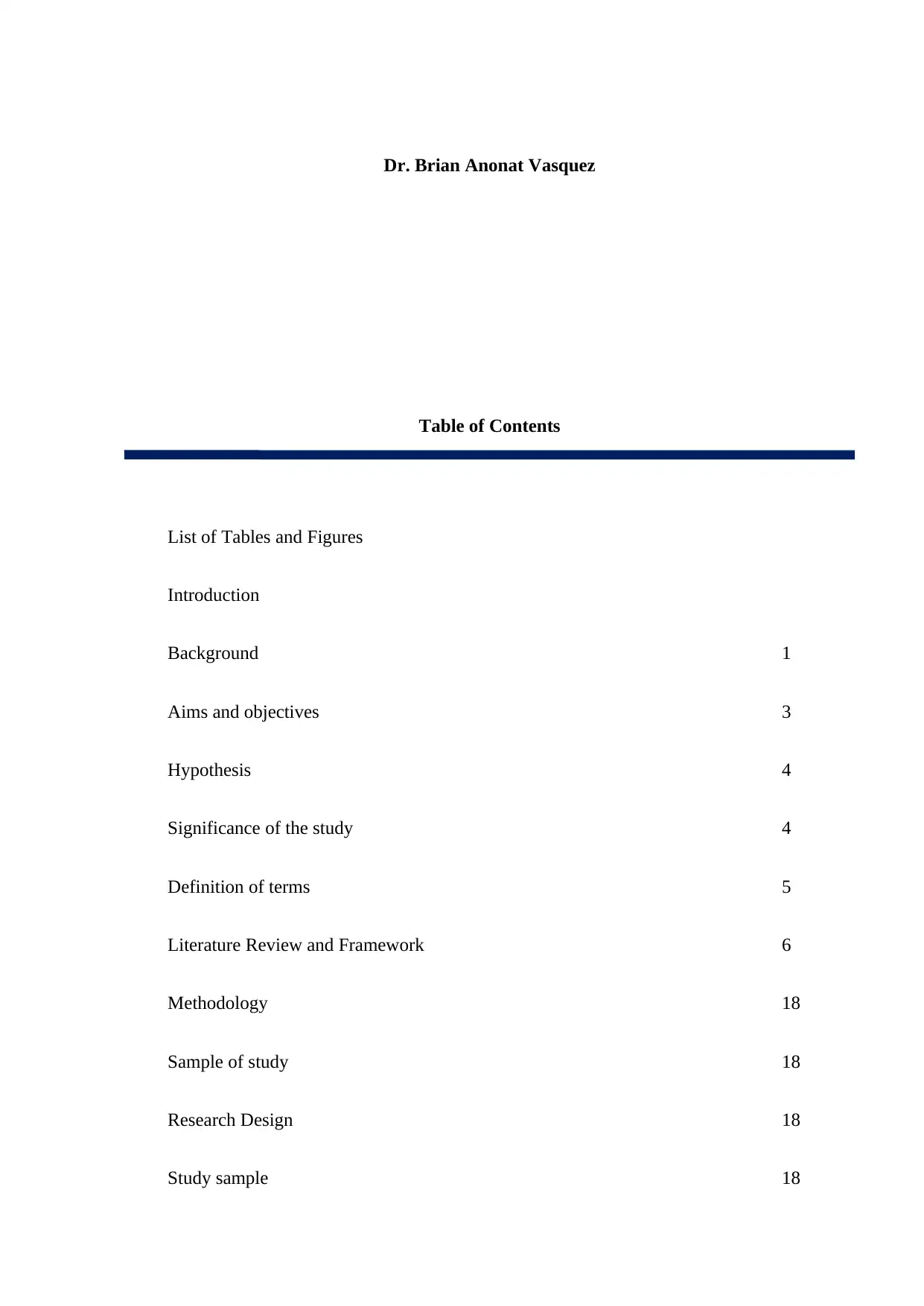
Dr. Brian Anonat Vasquez
Table of Contents
List of Tables and Figures
Introduction
Background 1
Aims and objectives 3
Hypothesis 4
Significance of the study 4
Definition of terms 5
Literature Review and Framework 6
Methodology 18
Sample of study 18
Research Design 18
Study sample 18
Table of Contents
List of Tables and Figures
Introduction
Background 1
Aims and objectives 3
Hypothesis 4
Significance of the study 4
Definition of terms 5
Literature Review and Framework 6
Methodology 18
Sample of study 18
Research Design 18
Study sample 18
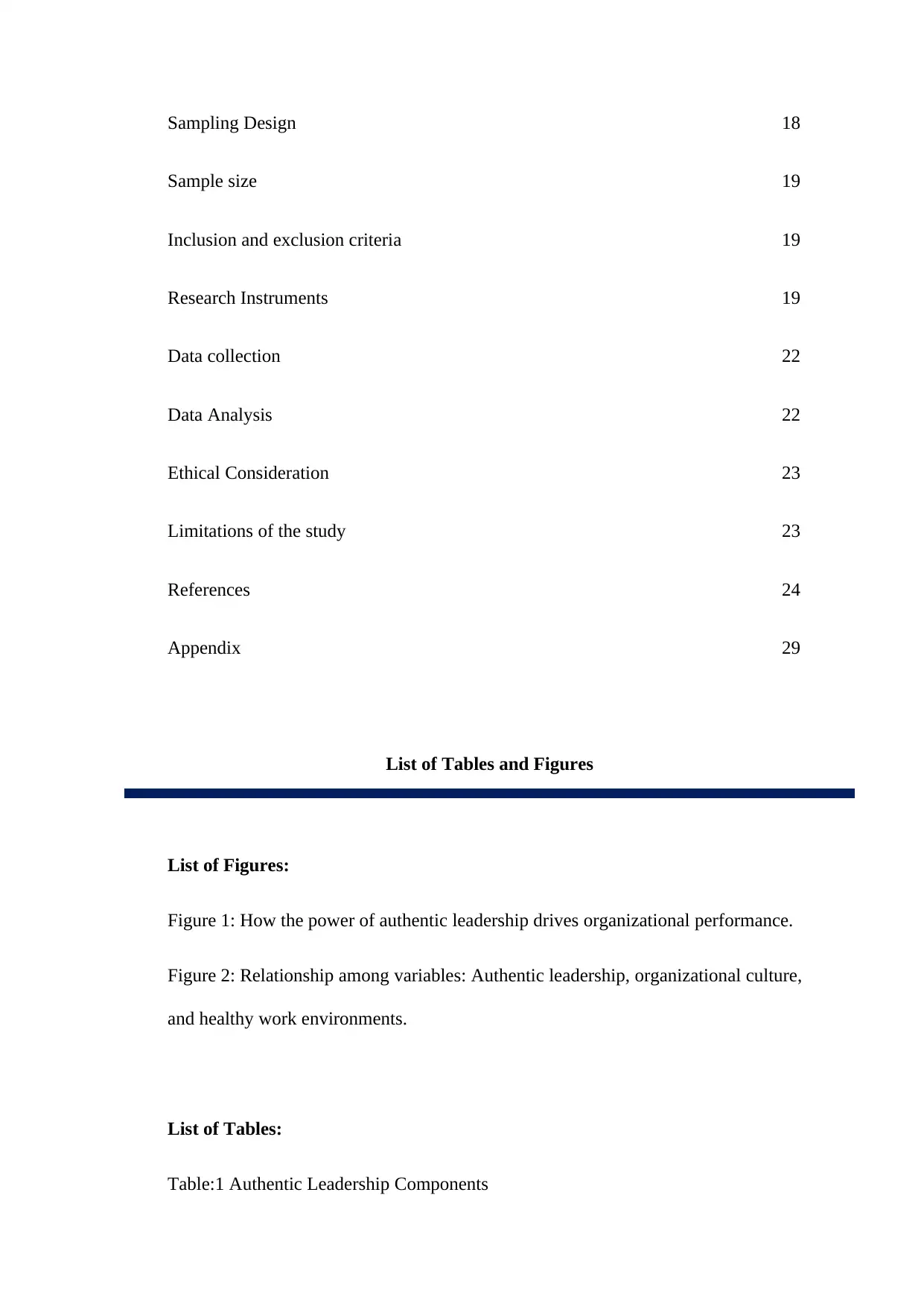
Sampling Design 18
Sample size 19
Inclusion and exclusion criteria 19
Research Instruments 19
Data collection 22
Data Analysis 22
Ethical Consideration 23
Limitations of the study 23
References 24
Appendix 29
List of Tables and Figures
List of Figures:
Figure 1: How the power of authentic leadership drives organizational performance.
Figure 2: Relationship among variables: Authentic leadership, organizational culture,
and healthy work environments.
List of Tables:
Table:1 Authentic Leadership Components
Sample size 19
Inclusion and exclusion criteria 19
Research Instruments 19
Data collection 22
Data Analysis 22
Ethical Consideration 23
Limitations of the study 23
References 24
Appendix 29
List of Tables and Figures
List of Figures:
Figure 1: How the power of authentic leadership drives organizational performance.
Figure 2: Relationship among variables: Authentic leadership, organizational culture,
and healthy work environments.
List of Tables:
Table:1 Authentic Leadership Components
⊘ This is a preview!⊘
Do you want full access?
Subscribe today to unlock all pages.

Trusted by 1+ million students worldwide

Paraphrase This Document
Need a fresh take? Get an instant paraphrase of this document with our AI Paraphraser

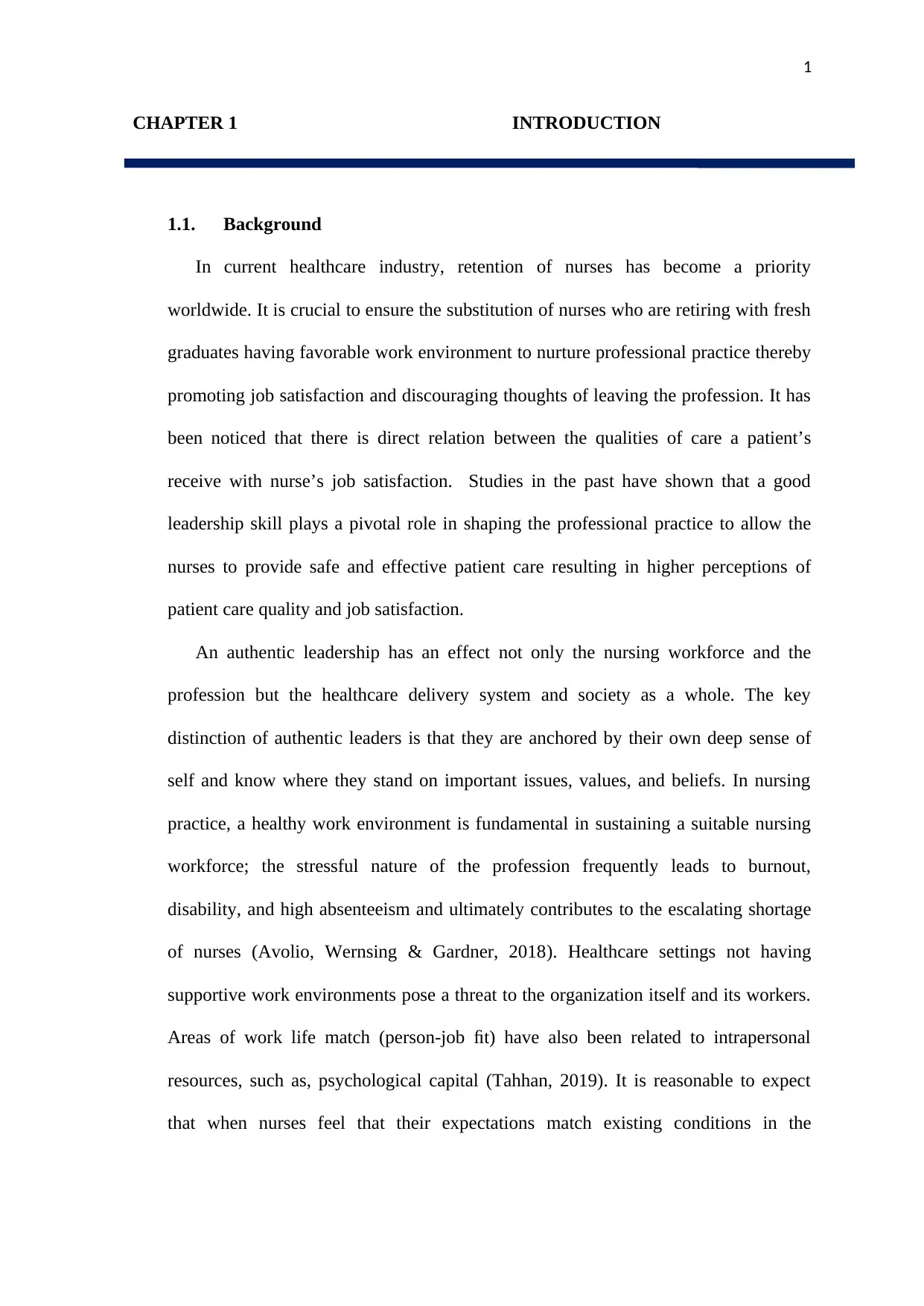
1
CHAPTER 1 INTRODUCTION
1.1. Background
In current healthcare industry, retention of nurses has become a priority
worldwide. It is crucial to ensure the substitution of nurses who are retiring with fresh
graduates having favorable work environment to nurture professional practice thereby
promoting job satisfaction and discouraging thoughts of leaving the profession. It has
been noticed that there is direct relation between the qualities of care a patient’s
receive with nurse’s job satisfaction. Studies in the past have shown that a good
leadership skill plays a pivotal role in shaping the professional practice to allow the
nurses to provide safe and effective patient care resulting in higher perceptions of
patient care quality and job satisfaction.
An authentic leadership has an effect not only the nursing workforce and the
profession but the healthcare delivery system and society as a whole. The key
distinction of authentic leaders is that they are anchored by their own deep sense of
self and know where they stand on important issues, values, and beliefs. In nursing
practice, a healthy work environment is fundamental in sustaining a suitable nursing
workforce; the stressful nature of the profession frequently leads to burnout,
disability, and high absenteeism and ultimately contributes to the escalating shortage
of nurses (Avolio, Wernsing & Gardner, 2018). Healthcare settings not having
supportive work environments pose a threat to the organization itself and its workers.
Areas of work life match (person-job fit) have also been related to intrapersonal
resources, such as, psychological capital (Tahhan, 2019). It is reasonable to expect
that when nurses feel that their expectations match existing conditions in the
CHAPTER 1 INTRODUCTION
1.1. Background
In current healthcare industry, retention of nurses has become a priority
worldwide. It is crucial to ensure the substitution of nurses who are retiring with fresh
graduates having favorable work environment to nurture professional practice thereby
promoting job satisfaction and discouraging thoughts of leaving the profession. It has
been noticed that there is direct relation between the qualities of care a patient’s
receive with nurse’s job satisfaction. Studies in the past have shown that a good
leadership skill plays a pivotal role in shaping the professional practice to allow the
nurses to provide safe and effective patient care resulting in higher perceptions of
patient care quality and job satisfaction.
An authentic leadership has an effect not only the nursing workforce and the
profession but the healthcare delivery system and society as a whole. The key
distinction of authentic leaders is that they are anchored by their own deep sense of
self and know where they stand on important issues, values, and beliefs. In nursing
practice, a healthy work environment is fundamental in sustaining a suitable nursing
workforce; the stressful nature of the profession frequently leads to burnout,
disability, and high absenteeism and ultimately contributes to the escalating shortage
of nurses (Avolio, Wernsing & Gardner, 2018). Healthcare settings not having
supportive work environments pose a threat to the organization itself and its workers.
Areas of work life match (person-job fit) have also been related to intrapersonal
resources, such as, psychological capital (Tahhan, 2019). It is reasonable to expect
that when nurses feel that their expectations match existing conditions in the
⊘ This is a preview!⊘
Do you want full access?
Subscribe today to unlock all pages.

Trusted by 1+ million students worldwide
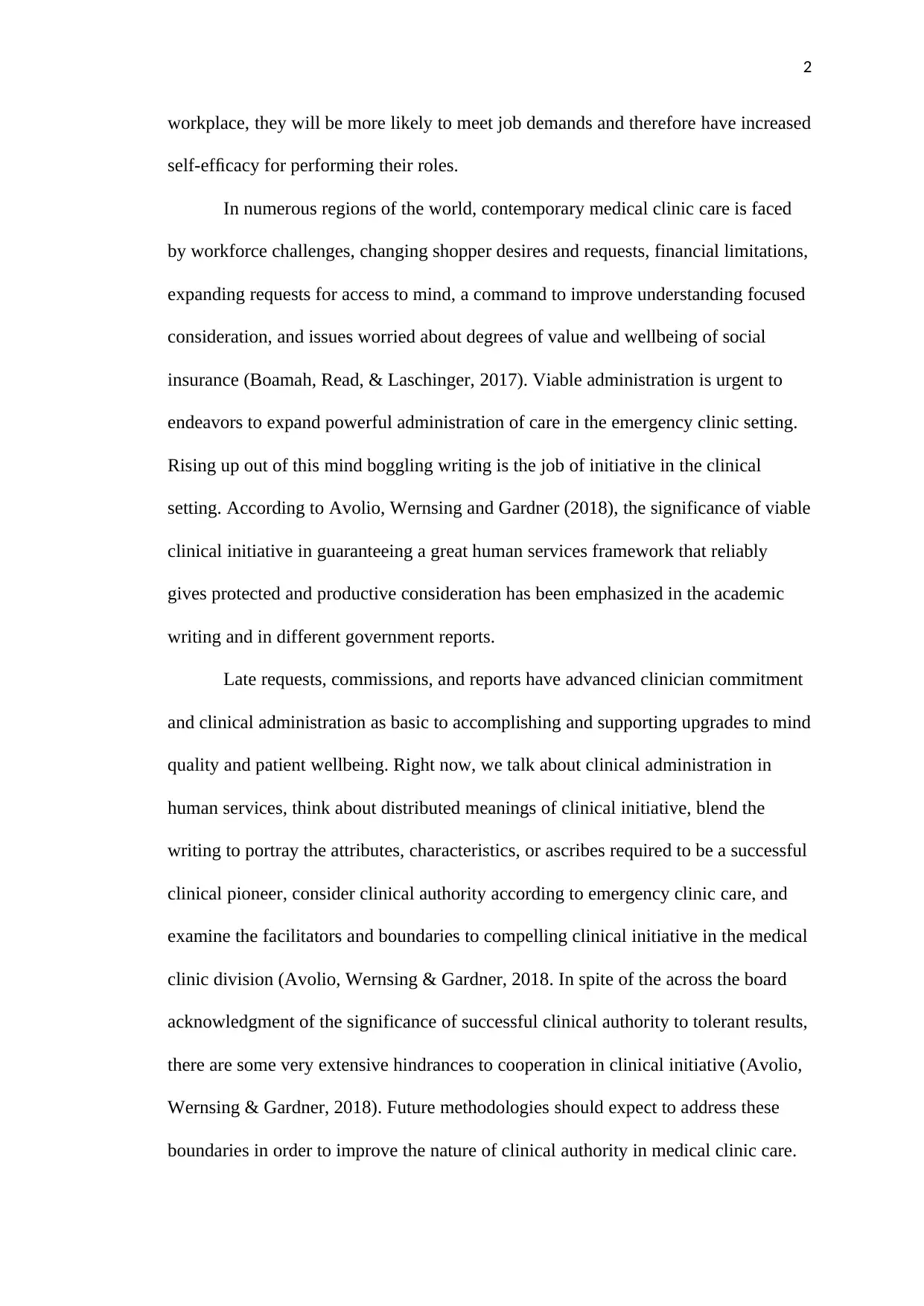
2
workplace, they will be more likely to meet job demands and therefore have increased
self-efficacy for performing their roles.
In numerous regions of the world, contemporary medical clinic care is faced
by workforce challenges, changing shopper desires and requests, financial limitations,
expanding requests for access to mind, a command to improve understanding focused
consideration, and issues worried about degrees of value and wellbeing of social
insurance (Boamah, Read, & Laschinger, 2017). Viable administration is urgent to
endeavors to expand powerful administration of care in the emergency clinic setting.
Rising up out of this mind boggling writing is the job of initiative in the clinical
setting. According to Avolio, Wernsing and Gardner (2018), the significance of viable
clinical initiative in guaranteeing a great human services framework that reliably
gives protected and productive consideration has been emphasized in the academic
writing and in different government reports.
Late requests, commissions, and reports have advanced clinician commitment
and clinical administration as basic to accomplishing and supporting upgrades to mind
quality and patient wellbeing. Right now, we talk about clinical administration in
human services, think about distributed meanings of clinical initiative, blend the
writing to portray the attributes, characteristics, or ascribes required to be a successful
clinical pioneer, consider clinical authority according to emergency clinic care, and
examine the facilitators and boundaries to compelling clinical initiative in the medical
clinic division (Avolio, Wernsing & Gardner, 2018. In spite of the across the board
acknowledgment of the significance of successful clinical authority to tolerant results,
there are some very extensive hindrances to cooperation in clinical initiative (Avolio,
Wernsing & Gardner, 2018). Future methodologies should expect to address these
boundaries in order to improve the nature of clinical authority in medical clinic care.
workplace, they will be more likely to meet job demands and therefore have increased
self-efficacy for performing their roles.
In numerous regions of the world, contemporary medical clinic care is faced
by workforce challenges, changing shopper desires and requests, financial limitations,
expanding requests for access to mind, a command to improve understanding focused
consideration, and issues worried about degrees of value and wellbeing of social
insurance (Boamah, Read, & Laschinger, 2017). Viable administration is urgent to
endeavors to expand powerful administration of care in the emergency clinic setting.
Rising up out of this mind boggling writing is the job of initiative in the clinical
setting. According to Avolio, Wernsing and Gardner (2018), the significance of viable
clinical initiative in guaranteeing a great human services framework that reliably
gives protected and productive consideration has been emphasized in the academic
writing and in different government reports.
Late requests, commissions, and reports have advanced clinician commitment
and clinical administration as basic to accomplishing and supporting upgrades to mind
quality and patient wellbeing. Right now, we talk about clinical administration in
human services, think about distributed meanings of clinical initiative, blend the
writing to portray the attributes, characteristics, or ascribes required to be a successful
clinical pioneer, consider clinical authority according to emergency clinic care, and
examine the facilitators and boundaries to compelling clinical initiative in the medical
clinic division (Avolio, Wernsing & Gardner, 2018. In spite of the across the board
acknowledgment of the significance of successful clinical authority to tolerant results,
there are some very extensive hindrances to cooperation in clinical initiative (Avolio,
Wernsing & Gardner, 2018). Future methodologies should expect to address these
boundaries in order to improve the nature of clinical authority in medical clinic care.
Paraphrase This Document
Need a fresh take? Get an instant paraphrase of this document with our AI Paraphraser
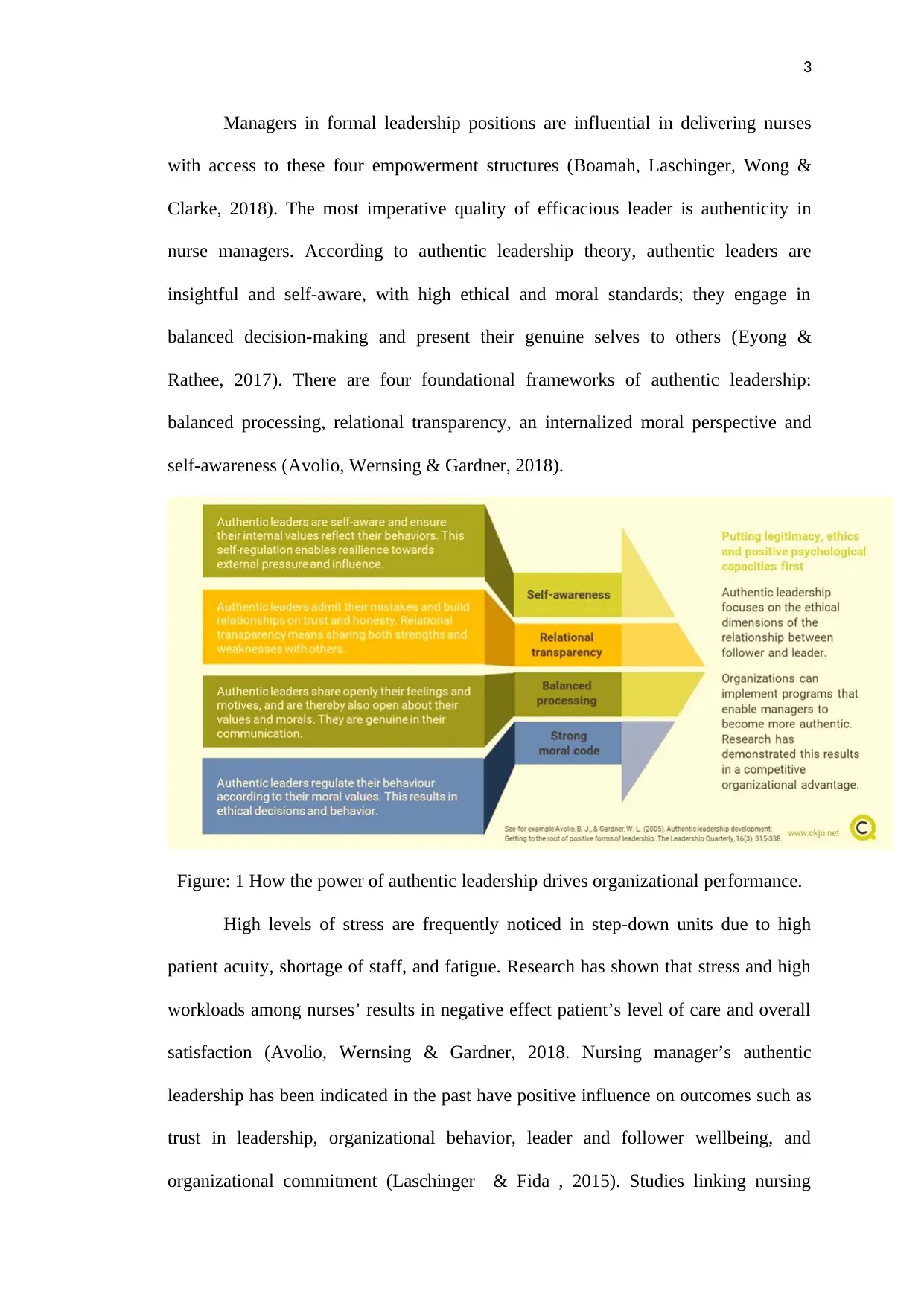
3
Managers in formal leadership positions are influential in delivering nurses
with access to these four empowerment structures (Boamah, Laschinger, Wong &
Clarke, 2018). The most imperative quality of efficacious leader is authenticity in
nurse managers. According to authentic leadership theory, authentic leaders are
insightful and self-aware, with high ethical and moral standards; they engage in
balanced decision-making and present their genuine selves to others (Eyong &
Rathee, 2017). There are four foundational frameworks of authentic leadership:
balanced processing, relational transparency, an internalized moral perspective and
self-awareness (Avolio, Wernsing & Gardner, 2018).
Figure: 1 How the power of authentic leadership drives organizational performance.
High levels of stress are frequently noticed in step-down units due to high
patient acuity, shortage of staff, and fatigue. Research has shown that stress and high
workloads among nurses’ results in negative effect patient’s level of care and overall
satisfaction (Avolio, Wernsing & Gardner, 2018. Nursing manager’s authentic
leadership has been indicated in the past have positive influence on outcomes such as
trust in leadership, organizational behavior, leader and follower wellbeing, and
organizational commitment (Laschinger & Fida , 2015). Studies linking nursing
Managers in formal leadership positions are influential in delivering nurses
with access to these four empowerment structures (Boamah, Laschinger, Wong &
Clarke, 2018). The most imperative quality of efficacious leader is authenticity in
nurse managers. According to authentic leadership theory, authentic leaders are
insightful and self-aware, with high ethical and moral standards; they engage in
balanced decision-making and present their genuine selves to others (Eyong &
Rathee, 2017). There are four foundational frameworks of authentic leadership:
balanced processing, relational transparency, an internalized moral perspective and
self-awareness (Avolio, Wernsing & Gardner, 2018).
Figure: 1 How the power of authentic leadership drives organizational performance.
High levels of stress are frequently noticed in step-down units due to high
patient acuity, shortage of staff, and fatigue. Research has shown that stress and high
workloads among nurses’ results in negative effect patient’s level of care and overall
satisfaction (Avolio, Wernsing & Gardner, 2018. Nursing manager’s authentic
leadership has been indicated in the past have positive influence on outcomes such as
trust in leadership, organizational behavior, leader and follower wellbeing, and
organizational commitment (Laschinger & Fida , 2015). Studies linking nursing
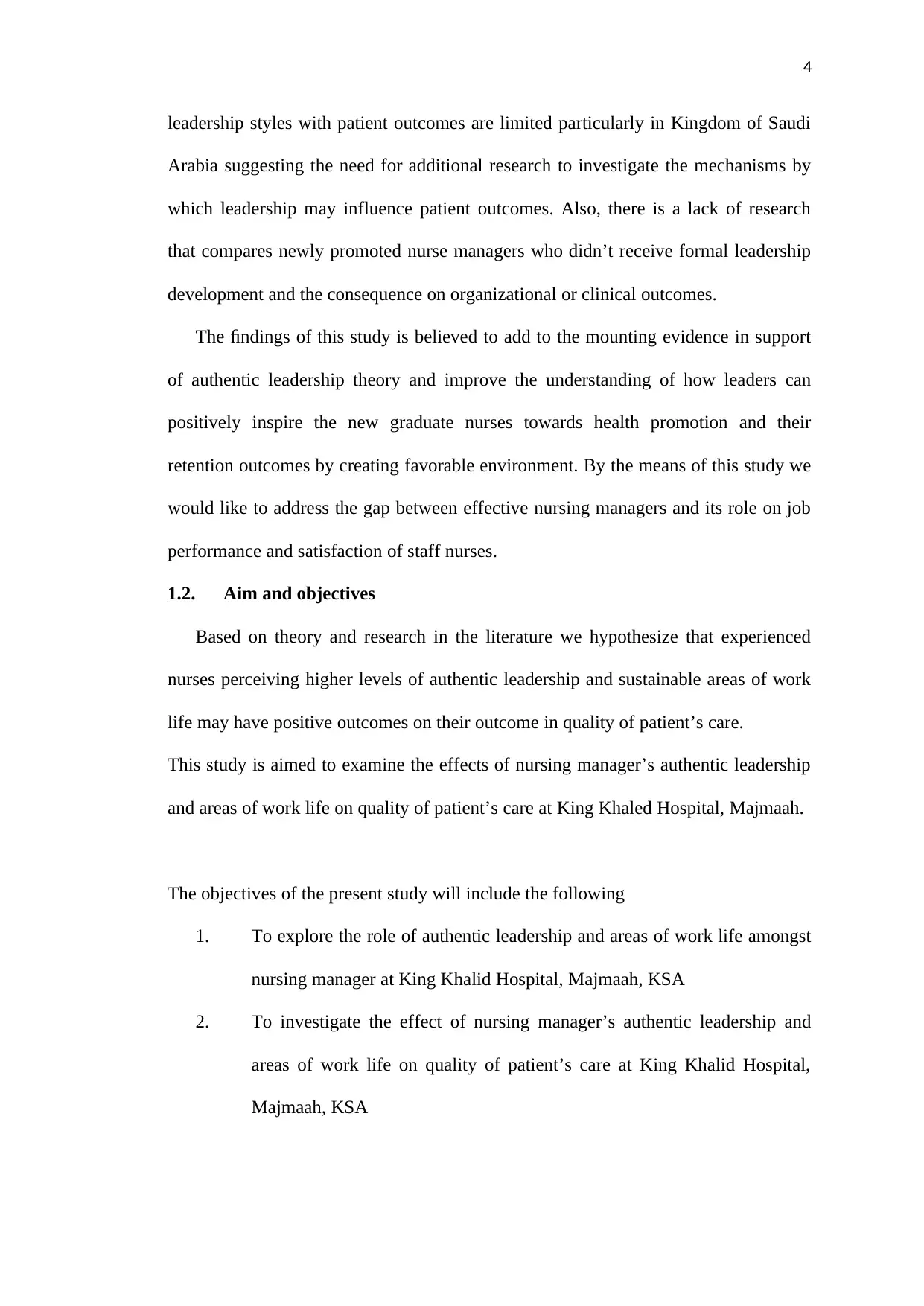
4
leadership styles with patient outcomes are limited particularly in Kingdom of Saudi
Arabia suggesting the need for additional research to investigate the mechanisms by
which leadership may influence patient outcomes. Also, there is a lack of research
that compares newly promoted nurse managers who didn’t receive formal leadership
development and the consequence on organizational or clinical outcomes.
The findings of this study is believed to add to the mounting evidence in support
of authentic leadership theory and improve the understanding of how leaders can
positively inspire the new graduate nurses towards health promotion and their
retention outcomes by creating favorable environment. By the means of this study we
would like to address the gap between effective nursing managers and its role on job
performance and satisfaction of staff nurses.
1.2. Aim and objectives
Based on theory and research in the literature we hypothesize that experienced
nurses perceiving higher levels of authentic leadership and sustainable areas of work
life may have positive outcomes on their outcome in quality of patient’s care.
This study is aimed to examine the effects of nursing manager’s authentic leadership
and areas of work life on quality of patient’s care at King Khaled Hospital, Majmaah.
The objectives of the present study will include the following
1. To explore the role of authentic leadership and areas of work life amongst
nursing manager at King Khalid Hospital, Majmaah, KSA
2. To investigate the effect of nursing manager’s authentic leadership and
areas of work life on quality of patient’s care at King Khalid Hospital,
Majmaah, KSA
leadership styles with patient outcomes are limited particularly in Kingdom of Saudi
Arabia suggesting the need for additional research to investigate the mechanisms by
which leadership may influence patient outcomes. Also, there is a lack of research
that compares newly promoted nurse managers who didn’t receive formal leadership
development and the consequence on organizational or clinical outcomes.
The findings of this study is believed to add to the mounting evidence in support
of authentic leadership theory and improve the understanding of how leaders can
positively inspire the new graduate nurses towards health promotion and their
retention outcomes by creating favorable environment. By the means of this study we
would like to address the gap between effective nursing managers and its role on job
performance and satisfaction of staff nurses.
1.2. Aim and objectives
Based on theory and research in the literature we hypothesize that experienced
nurses perceiving higher levels of authentic leadership and sustainable areas of work
life may have positive outcomes on their outcome in quality of patient’s care.
This study is aimed to examine the effects of nursing manager’s authentic leadership
and areas of work life on quality of patient’s care at King Khaled Hospital, Majmaah.
The objectives of the present study will include the following
1. To explore the role of authentic leadership and areas of work life amongst
nursing manager at King Khalid Hospital, Majmaah, KSA
2. To investigate the effect of nursing manager’s authentic leadership and
areas of work life on quality of patient’s care at King Khalid Hospital,
Majmaah, KSA
⊘ This is a preview!⊘
Do you want full access?
Subscribe today to unlock all pages.

Trusted by 1+ million students worldwide
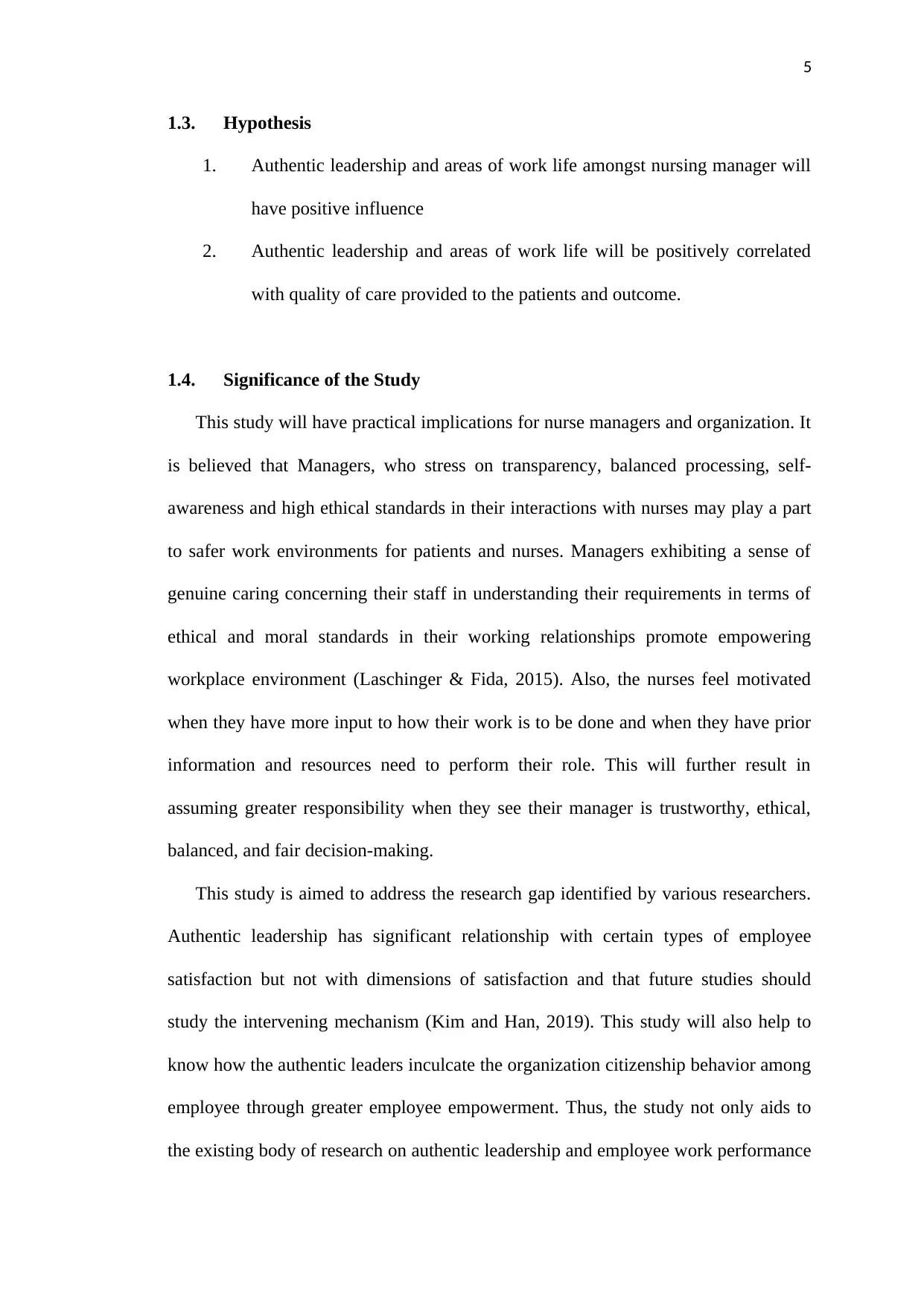
5
1.3. Hypothesis
1. Authentic leadership and areas of work life amongst nursing manager will
have positive influence
2. Authentic leadership and areas of work life will be positively correlated
with quality of care provided to the patients and outcome.
1.4. Significance of the Study
This study will have practical implications for nurse managers and organization. It
is believed that Managers, who stress on transparency, balanced processing, self-
awareness and high ethical standards in their interactions with nurses may play a part
to safer work environments for patients and nurses. Managers exhibiting a sense of
genuine caring concerning their staff in understanding their requirements in terms of
ethical and moral standards in their working relationships promote empowering
workplace environment (Laschinger & Fida, 2015). Also, the nurses feel motivated
when they have more input to how their work is to be done and when they have prior
information and resources need to perform their role. This will further result in
assuming greater responsibility when they see their manager is trustworthy, ethical,
balanced, and fair decision-making.
This study is aimed to address the research gap identified by various researchers.
Authentic leadership has significant relationship with certain types of employee
satisfaction but not with dimensions of satisfaction and that future studies should
study the intervening mechanism (Kim and Han, 2019). This study will also help to
know how the authentic leaders inculcate the organization citizenship behavior among
employee through greater employee empowerment. Thus, the study not only aids to
the existing body of research on authentic leadership and employee work performance
1.3. Hypothesis
1. Authentic leadership and areas of work life amongst nursing manager will
have positive influence
2. Authentic leadership and areas of work life will be positively correlated
with quality of care provided to the patients and outcome.
1.4. Significance of the Study
This study will have practical implications for nurse managers and organization. It
is believed that Managers, who stress on transparency, balanced processing, self-
awareness and high ethical standards in their interactions with nurses may play a part
to safer work environments for patients and nurses. Managers exhibiting a sense of
genuine caring concerning their staff in understanding their requirements in terms of
ethical and moral standards in their working relationships promote empowering
workplace environment (Laschinger & Fida, 2015). Also, the nurses feel motivated
when they have more input to how their work is to be done and when they have prior
information and resources need to perform their role. This will further result in
assuming greater responsibility when they see their manager is trustworthy, ethical,
balanced, and fair decision-making.
This study is aimed to address the research gap identified by various researchers.
Authentic leadership has significant relationship with certain types of employee
satisfaction but not with dimensions of satisfaction and that future studies should
study the intervening mechanism (Kim and Han, 2019). This study will also help to
know how the authentic leaders inculcate the organization citizenship behavior among
employee through greater employee empowerment. Thus, the study not only aids to
the existing body of research on authentic leadership and employee work performance
Paraphrase This Document
Need a fresh take? Get an instant paraphrase of this document with our AI Paraphraser
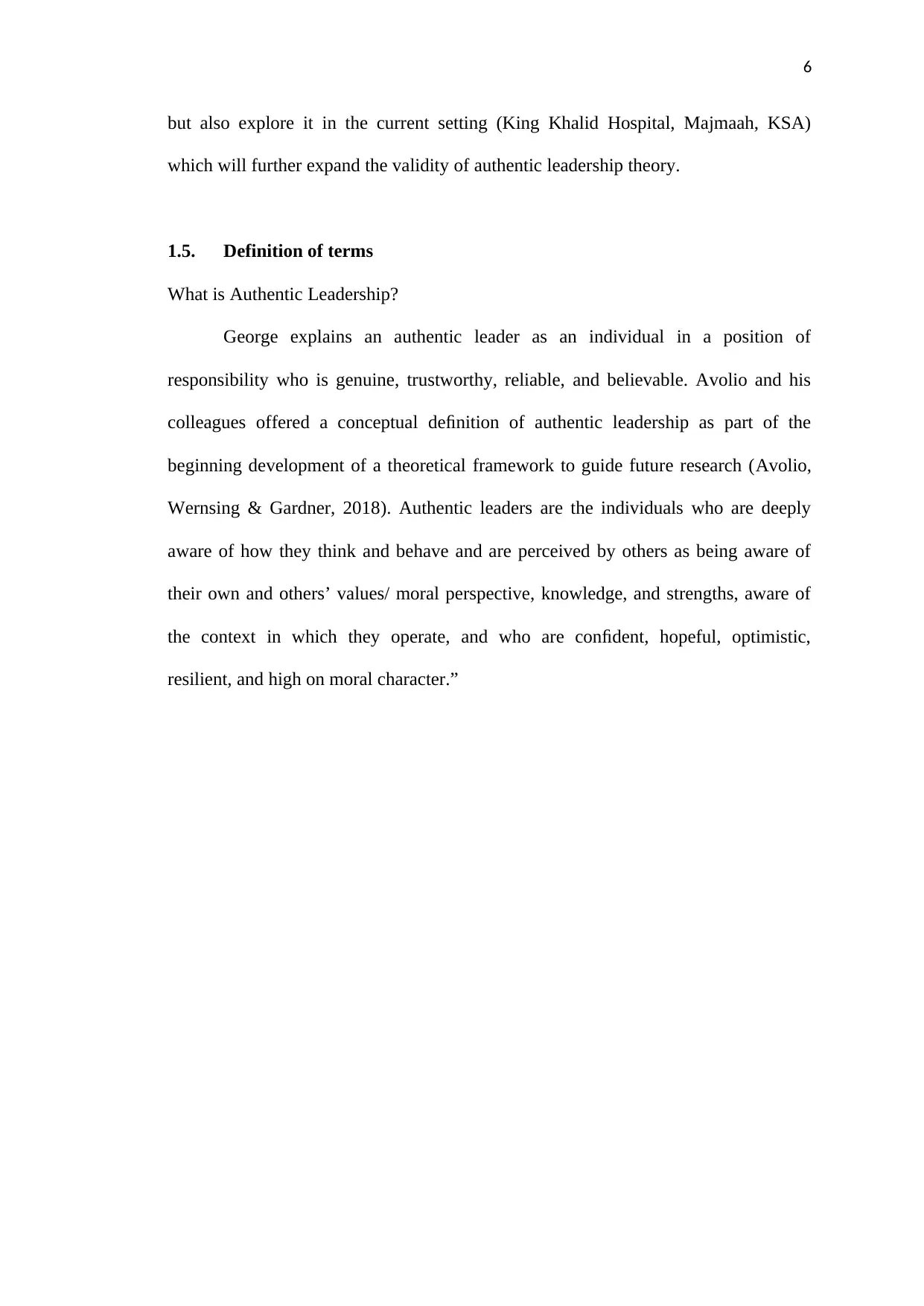
6
but also explore it in the current setting (King Khalid Hospital, Majmaah, KSA)
which will further expand the validity of authentic leadership theory.
1.5. Definition of terms
What is Authentic Leadership?
George explains an authentic leader as an individual in a position of
responsibility who is genuine, trustworthy, reliable, and believable. Avolio and his
colleagues offered a conceptual definition of authentic leadership as part of the
beginning development of a theoretical framework to guide future research (Avolio,
Wernsing & Gardner, 2018). Authentic leaders are the individuals who are deeply
aware of how they think and behave and are perceived by others as being aware of
their own and others’ values/ moral perspective, knowledge, and strengths, aware of
the context in which they operate, and who are confident, hopeful, optimistic,
resilient, and high on moral character.”
but also explore it in the current setting (King Khalid Hospital, Majmaah, KSA)
which will further expand the validity of authentic leadership theory.
1.5. Definition of terms
What is Authentic Leadership?
George explains an authentic leader as an individual in a position of
responsibility who is genuine, trustworthy, reliable, and believable. Avolio and his
colleagues offered a conceptual definition of authentic leadership as part of the
beginning development of a theoretical framework to guide future research (Avolio,
Wernsing & Gardner, 2018). Authentic leaders are the individuals who are deeply
aware of how they think and behave and are perceived by others as being aware of
their own and others’ values/ moral perspective, knowledge, and strengths, aware of
the context in which they operate, and who are confident, hopeful, optimistic,
resilient, and high on moral character.”
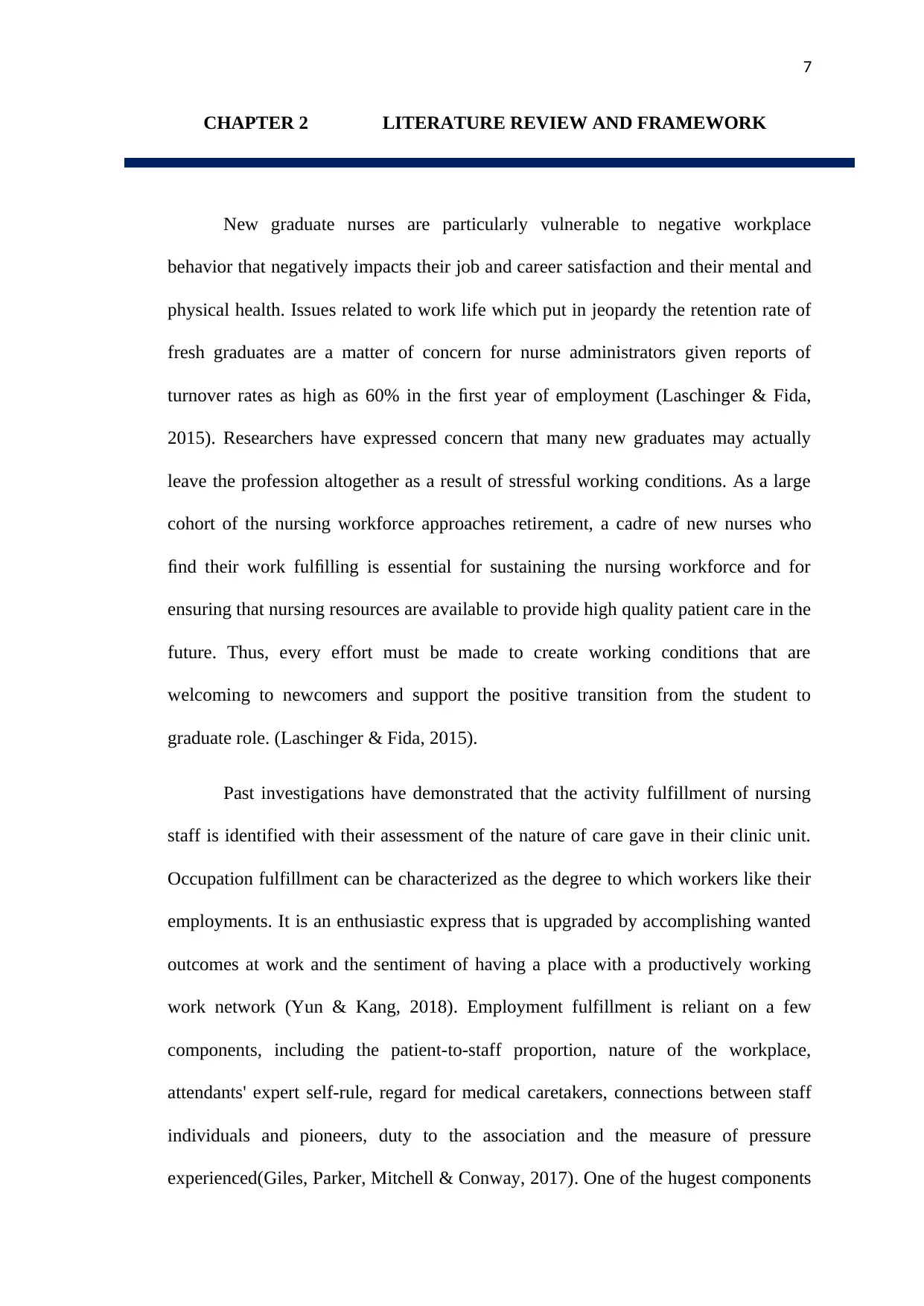
7
CHAPTER 2 LITERATURE REVIEW AND FRAMEWORK
New graduate nurses are particularly vulnerable to negative workplace
behavior that negatively impacts their job and career satisfaction and their mental and
physical health. Issues related to work life which put in jeopardy the retention rate of
fresh graduates are a matter of concern for nurse administrators given reports of
turnover rates as high as 60% in the first year of employment (Laschinger & Fida,
2015). Researchers have expressed concern that many new graduates may actually
leave the profession altogether as a result of stressful working conditions. As a large
cohort of the nursing workforce approaches retirement, a cadre of new nurses who
find their work fulfilling is essential for sustaining the nursing workforce and for
ensuring that nursing resources are available to provide high quality patient care in the
future. Thus, every effort must be made to create working conditions that are
welcoming to newcomers and support the positive transition from the student to
graduate role. (Laschinger & Fida, 2015).
Past investigations have demonstrated that the activity fulfillment of nursing
staff is identified with their assessment of the nature of care gave in their clinic unit.
Occupation fulfillment can be characterized as the degree to which workers like their
employments. It is an enthusiastic express that is upgraded by accomplishing wanted
outcomes at work and the sentiment of having a place with a productively working
work network (Yun & Kang, 2018). Employment fulfillment is reliant on a few
components, including the patient-to-staff proportion, nature of the workplace,
attendants' expert self-rule, regard for medical caretakers, connections between staff
individuals and pioneers, duty to the association and the measure of pressure
experienced(Giles, Parker, Mitchell & Conway, 2017). One of the hugest components
CHAPTER 2 LITERATURE REVIEW AND FRAMEWORK
New graduate nurses are particularly vulnerable to negative workplace
behavior that negatively impacts their job and career satisfaction and their mental and
physical health. Issues related to work life which put in jeopardy the retention rate of
fresh graduates are a matter of concern for nurse administrators given reports of
turnover rates as high as 60% in the first year of employment (Laschinger & Fida,
2015). Researchers have expressed concern that many new graduates may actually
leave the profession altogether as a result of stressful working conditions. As a large
cohort of the nursing workforce approaches retirement, a cadre of new nurses who
find their work fulfilling is essential for sustaining the nursing workforce and for
ensuring that nursing resources are available to provide high quality patient care in the
future. Thus, every effort must be made to create working conditions that are
welcoming to newcomers and support the positive transition from the student to
graduate role. (Laschinger & Fida, 2015).
Past investigations have demonstrated that the activity fulfillment of nursing
staff is identified with their assessment of the nature of care gave in their clinic unit.
Occupation fulfillment can be characterized as the degree to which workers like their
employments. It is an enthusiastic express that is upgraded by accomplishing wanted
outcomes at work and the sentiment of having a place with a productively working
work network (Yun & Kang, 2018). Employment fulfillment is reliant on a few
components, including the patient-to-staff proportion, nature of the workplace,
attendants' expert self-rule, regard for medical caretakers, connections between staff
individuals and pioneers, duty to the association and the measure of pressure
experienced(Giles, Parker, Mitchell & Conway, 2017). One of the hugest components
⊘ This is a preview!⊘
Do you want full access?
Subscribe today to unlock all pages.

Trusted by 1+ million students worldwide
1 out of 50
Related Documents
Your All-in-One AI-Powered Toolkit for Academic Success.
+13062052269
info@desklib.com
Available 24*7 on WhatsApp / Email
![[object Object]](/_next/static/media/star-bottom.7253800d.svg)
Unlock your academic potential
Copyright © 2020–2026 A2Z Services. All Rights Reserved. Developed and managed by ZUCOL.




